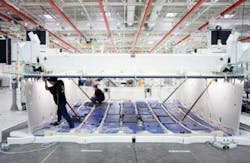Smart Tools will Drive Efficiency in the Factory of the Future
I recently had the opportunity to talk with Theresa Woodiel, NI’s Global Campaign Manager, Embedded Systems, to learn more about NI’s integrated software and hardware platforms that have been on display, helping to provide device management and a wide range of other functions.
Theresa explained that, with the help of NI, concepts similar to those at the heart of the IIC Track & Trace testbed are actually being put into practice at Airbus, where a new kind of factory floor is coming into being. It is, in part, driven by NI technology with sensors, software and data, and enhancing the power and control of individual workers.
Airbus Nantes Centre Wing Box Assembly
Smart tools are a key element in the process, communicating with both the factory-wide infrastructure, with the individual worker, and with other tools. These interconnections enhance the productivity of the individual and provide support for doing the job right – helping to identify needed tasks, verifying which tools are needed for each job, and ensuring that mistakes are avoided. Information needed for assembly operations is always available in context and as needed. And, of course, the system improves decision making on factory floor and for the business as a whole.
One of the most obvious benefits for staff is reducing and eliminating the use of physical logs and manuals, which are a key part of exacting aerospace manufacturing. Working together, the tools and the IT infrastructure log the torque applied to each fastener and store the information to a central manufacturing execution system (MES) or enterprise resource planning (ERP) system. Rather than just being record keepers, workers can now concentrate on the tasks at hand knowing the data will be captured and retained.
This kind of technology can have huge productivity and quality benefits when one considers that an aircraft could easily have 400,000 points where a tool must be applied. Keeping track of the operations and the necessary tools is always a challenging task for staff – but smart factory technologies at Airbus make it much more manageable. The smart factory even includes special glasses that visually highlight fasteners not yet properly torqued, enhancing productivity and simplifying individual tasks.
As part of its initiative, Airbus says it is also launching the development of three smart tool families for drilling, measuring, and quality data logging and tightening.
NI’s contribution to the project consists of systems on modules (SOMs) and embedded single-board computers (SBCs) as well as development software, which Airbus said has helped speed the project – allowing milestones to be reached in one-tenth of the time expected.
According to Theresa Woodeil, NI has made a point to participate in multiple testbeds to make sure they can play with any of the emerging standards. “We believe you must have advanced hardware, but it is really going to be software that will drive a lot of the progress,” she says.
Learn more about the innovations National Instruments is using to improve Airbus factory floor efficiency in the case study, “Developing Smart Tools for the Airbus Factory of the Future.”
Alan R. Earls is a Boston-based writer focused on technology, business, and manufacturing — a field where he spent the earliest part of his career. He has written for publications and websites as diverse as The Boston Globe, Computerworld and Modern Infrastructure as well as Industry, The Manufacturer, and Today's Machining World.



